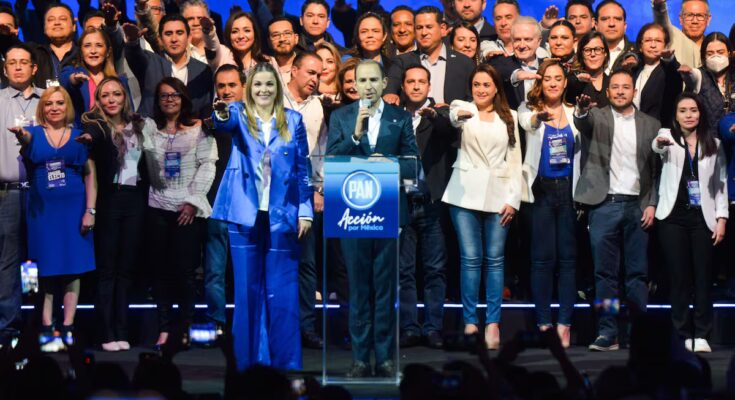The National Action Party (PAN) has taken the first step towards reforming its leadership statutes following its announced relaunch. The total openness of the Mexican party to citizens’ candidacies, the express affiliation of its militant members, as well as a clause that reverses the alternation at the top and gender equality are some of the changes approved by the Permanent Commission, the figure responsible for strategic decisions within the blue and whites. The National Assembly on November 29 will be the final stage for the changes that support the restyling of the right-wing party as it seeks to regain electoral ground in the 2027 mid-term elections. Nothing was mentioned about coalitions.
PAN members have opened the door to the selection of city candidates, the most striking ingredient in their plan to catch up and not disappear. Open primary elections, polls, direct election of active militancy and mixed method are the agreed formulas for selecting candidates. An attempt was made to cover all sides, even if the forms, according to the PAN leaders, risk opening the door to the nomination of less competitive candidates, creating too many filters. “I find it negative that there are changes that tie our hands to nominate good candidates,” says a member of the Political Council who believes that nominations should be defined by a single premise: that of the most competitive.
The changes to the PAN Statutes place emphasis on the selection of candidates, but also on the recruitment of militants on a piecework basis. All with one click, as its leader Jorge Romero said. At this point, the fine print becomes important. The PAN is preparing to register, in the short term and against time, all possible militants to increase a meager register of 270,000 members, just to the limit of the percentage of 256,000 that the National Electoral Institute (INE) requires to maintain the register, a figure that will have to be accredited in March next year. The reforms now distinguish two classes of militants. The members, i.e. those who expressly obtain registration, and the active militants, those who will have greater rights and duties. This is nothing new, an old figure who already applied PANism in a previous phase has come back to life.
“In the PAN there will be an adherent militancy and an active militancy, depending on the degree of commitment towards the party”, reads the amendment. “First and second class militants,” says Adriana Dávila, the PAN MP who fought Romero for the leadership. The requirements for being an express member are minimal: the most rigorous requires that interested parties undertake to conform and respect the principles of the party. Access to the second class has more conditions: being a militant member with one year of seniority, working in the area and training as an active member in the ranks of the PAN.
But there are more controversial points. In drafting the reforms, the ruling of the Electoral Tribunal ordering the party’s internal bodies to amend their statutes to implement a mechanism that allows for fair alternation in the next leadership elections in 2027 was annulled. This implied issuing a call in which only women could participate. Contrary to this court order, changes have been established that allow Romero to be re-elected in 2027. “When a man is elected in his first term (…) The convocation for the electoral process immediately following must be reserved exclusively for women, allowing the possibility of re-election of the interim president,” the statutory change states. “The gender issue will ultimately be defined by the Court. If it is a man (whoever wins the leadership) he will challenge a woman and vice versa, otherwise they will nominate a woman similar to Romero”, say the panistas who do not see a problem in the advantage granted to the current leader. “They will apply the same formula as Alito (Alejandro Moreno, PRI leader) to us,” scolds Dávila.
The relaunch of the PAN was announced in grand style weeks ago, on the basis of the electoral break with the PRI with which it had faced two coalition elections. “This is the era in which we panistas bet everything on the PAN,” Romero said as he presented the party’s new image. In the statutory reforms, nothing was left on the issue of alliances, which has become a flashpoint in a handful of states, where local leaders resist breaking with the PRI in the 2027 midterms. The PAN has activated a countdown to hold its next National Assembly on November 29 at a venue west of Mexico City. The meeting represents the second phase for the PAN to consolidate its restyling and activate its ambitious marketing campaign that repositions the party. The PAN leadership is betting on a successful meeting bringing together PAN heavyweights, including former presidents Vicente Fox and Felipe Calderón, who, they say, are far from accepting the invitation.


